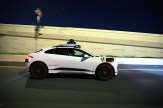For retail security provider, students offer a system upgrade

Northeastern University student-researchers have created technology designed to gather more meaningful information on customer habits, inventory and fire safety in retail stores such as CVS, Stop & Shop and The Home Depot.
The technology—which was developed as a College of Engineering senior capstone project—is part of an emerging partnership between Northeastern, Shanghai Jiao Tong University and Tyco International, Inc., a global manufacturing company.
Tyco, which organized the project, is the world’s largest provider to retailers of anti-theft loss prevention, safety and security solutions.
In April, Tyco executives met with members of Northeastern’s senior leadership team, toured campus and attended the capstone presentation, which included a video chat with engineering students in Shanghai who helped complete the project from some 7,200 miles away.
“We think we have tremendous potential to find great talent at Northeastern to help our organization around the globe,” Shelley Stewart, BS’75, MS’78, Tyco’s senior vice president of operational excellence and chief procurement officer, told students.
“We’re glad you worked in a collaborative way,” he said. “That’s what the world today is all about.”
Over a four-month period, students in Boston and Shanghai developed a proof of concept using Snell Library as a mock retail store.
Students displayed all of the information — including the location of books, computers and fire alarms — on digitized heat maps with geographic coordinates. The system, said project manager Samuel Bar, a senior industrial engineering major, could make for a strong fire safety application.
“If there’s a fire, you can see what type of products are in that particular area,” said Bar, who plans to join the Peace Corps. “If there are books, then firefighters might use one type of tactic, but if there are computers, they might use a different strategy.”
Combining all of the information on one map, said senior industrial engineering major Rebecca Payne, would make it easier for Tyco’s retail partners to run their businesses. They currently use three independent databases to track inventory, point of purchase and access control.
“Instead of studying inventory patterns or point of purchase, you could combine that together to get a whole new view of the business,” said Payne, who is moving to Los Angeles in July to work in organizational development for Staples.
“From a practical perspective,” she said, “it allows the data to speak and for you to make better business decisions.”
Good communication was key to completing the project, said Bar, who used his experience on co-op at a plastics and electronics factory in China to manage the partnership with their Shanghai teammates.
“Dealing with the intricacies of a different culture is challenging,” he said, “especially when doling out assignments or writing instructions.”





